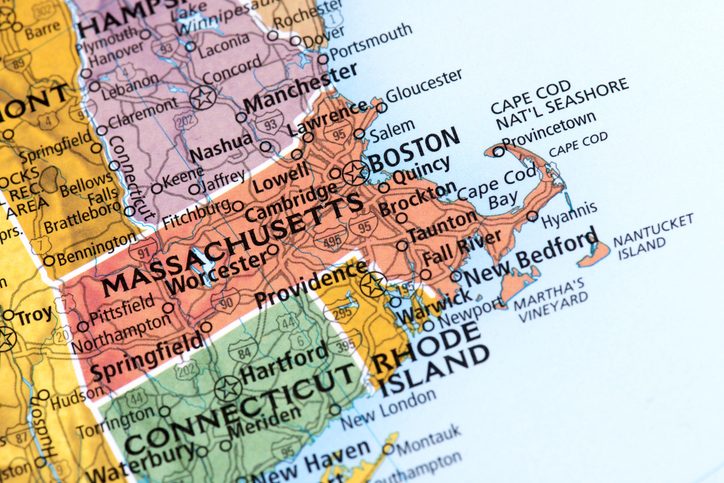Massachusetts participates in the Social Security system a little differently than most states. Massachusetts residents who belong to public-sector retirement plans don’t pay Social Security payroll taxes. As a result, these workers don’t earn credits toward Social Security benefits for their public-sector work. Some Massachusetts public workers may still qualify for Social Security benefits through credits earned by other employment or through spousal or survivor benefits. However, these benefits may be reduced. A financial advisor can help you figure out how much your Social Security benefits will be if you live in Massachusetts.
Social Security in Massachusetts
Most American workers pay into the Social Security system through 6.2% taxes withheld from their paychecks. Paying these taxes gives them credits that allow them to qualify to receive Social Security benefits when they retire. However, many people who are public-sector employees don’t pay into Social Security; when they retire, they may be eligible for reduced Social Security benefits, or no benefits at all.
Massachusetts is one of a few states in which nearly all public-sector employees don’t pay Social Security taxes and thus don’t earn credits for Social Security retirement benefits. Other non-Social Security states are Alaska, Colorado, Louisiana, Maine, Nevada and Ohio.
Because of this, if you are a public employee in Massachusetts covered by a retirement plan, federal law mandates a reduction in your Social Security benefits. Relevant public pension plans include the Massachusetts State Employee Retirement System, Massachusetts Optional Retirement Plan, Massachusetts OBRA Retirement Plan, University of Massachusetts GAP Retirement Plan, Massachusetts Teachers Retirement System, and various local plans covering police, firefighters and other public employees.
Two federal laws govern how Social Security benefits may be reduced for public-sector employees who don’t participate in the Social Security system. The Government Pension Offset affects spousal, widow and widower benefits, while the Windfall Elimination Provision covers benefits someone may earn based on their own work history.
Windfall Elimination Provision

The Windfall Elimination Provision may cause your Social Security benefit to be reduced if you are a Massachusetts public employee and have fewer than 30 years of working and paying into the Social Security system. It’s designed to prevent people from receiving both public pension benefits and full Social Security retirement benefits.
This provision may affect you in Massachusetts if you worked at a private-sector job for fewer than 30 years before joining a public employer. The amount of the reduction depends on the number of years you paid into Social Security. At most, this provision can reduce your benefits by half. An online calculator from Social Security allows you to figure out what your benefit will be in your specific situation.
Government Pension Offset
The Government Pension Offset can reduce or eliminate survivor or disability benefits from Social Security if you worked for a public employer in Massachusetts. It can come into play if you receive a government pension and apply for a spousal or survivor’s benefit from Social Security.
The offset reduces your monthly Social Security benefits $2 for every $3 from your monthly government pension. If you have a Massachusetts government pension of $900, for instance, the offset would be $900 times two-thirds, or $600. Social Security maintains an online calculator to help you figure out your benefits.
More on Massachusetts Social Security
Although Social Security benefits for public-sector workers in Massachusetts may be affected, Medicare is not. A public-sector employee will become eligible for the national healthcare insurance program at age 65 in Massachusetts whether or not they have paid into Social Security.
To get information about your Social Security benefits directly from the Social Security Administration, set up a MySocialSecurity account at SSA.gov. This free personal account lets you change your address, check your benefits, and do other tasks related to your Social Security account.
You can learn more about retirement benefits in Massachusetts from the Massachusetts Board of State Retirement. The National Conference of State Social Security Administrators maintains a list of contacts for state retirement officials that you can use to ask specific questions about your situation.
Bottom Line

As a non-Social Security state, Massachusetts exempts nearly all public employees from paying Social Security taxes. These employees may be subject to mandatory reductions on their Social Security benefits. One federal law, the Government Pension Offset, controls payments to spouses, widows and widowers of public employees, while the Windfall Elimination Provision affects Social Security benefits paid to people based on their own earnings record. Required reductions in benefits under these programs may block payment of some or all of the benefits a Massachusetts public employee would otherwise get from Social Security.
Social Security Tips
- Consider discussing your plans for funding a comfortable and secure retirement with a financial advisor. Finding a financial advisor doesn’t have to be hard. SmartAsset’s free tool matches you with up to three vetted financial advisors who serve your area, and you can have a free introductory call with your advisor matches to decide which one you feel is right for you. If you’re ready to find an advisor who can help you achieve your financial goals, get started now.
- Check out SmartAsset’s Social Security Calculator to estimate your future monthly retirement benefits.
Photo credit: ©iStock.com/omersukrugoksu, ©iStock.com/shironosov, ©iStock.com/PeopleImages
